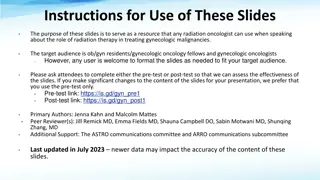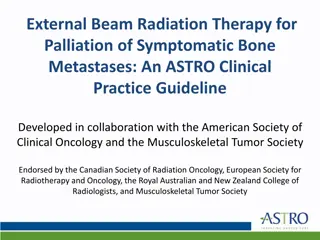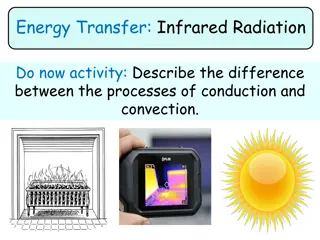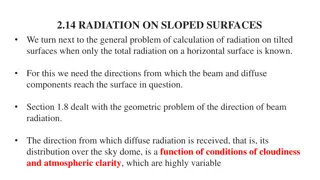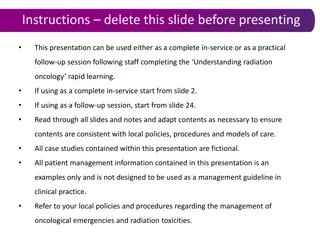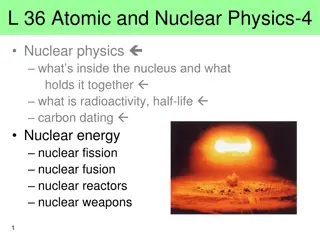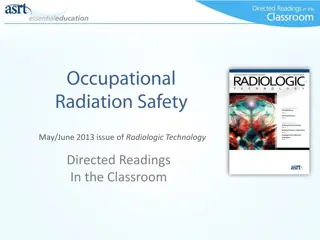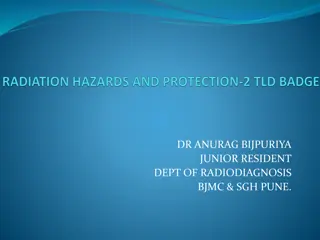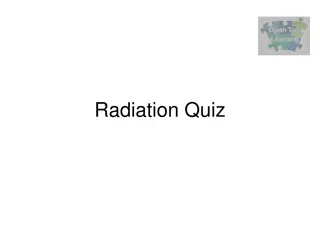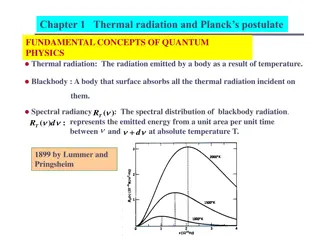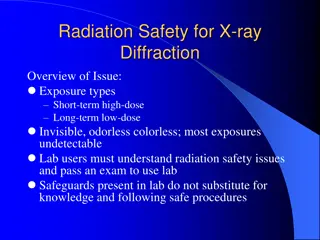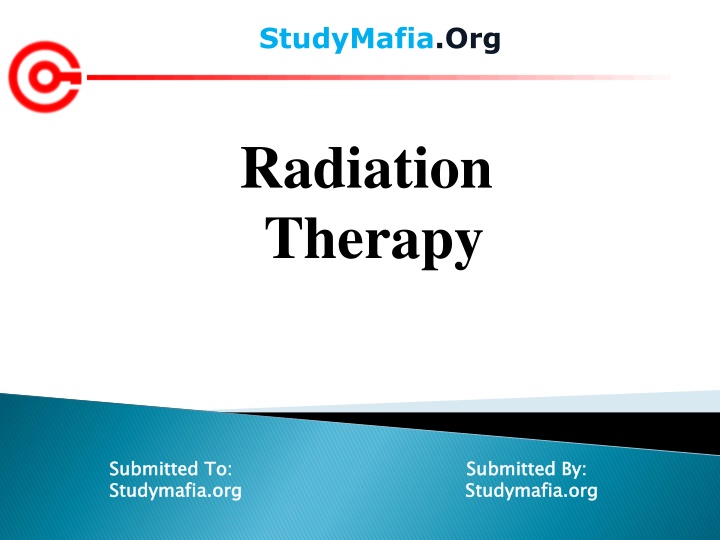
Radiation Therapy for Cancer Treatment
Learn about radiation therapy as a cancer treatment option, including its definition, how it works, reasons for use, potential risks, and expectations. Discover why radiation therapy is important in the fight against cancer and how it can be part of a comprehensive treatment plan.
Download Presentation

Please find below an Image/Link to download the presentation.
The content on the website is provided AS IS for your information and personal use only. It may not be sold, licensed, or shared on other websites without obtaining consent from the author. If you encounter any issues during the download, it is possible that the publisher has removed the file from their server.
You are allowed to download the files provided on this website for personal or commercial use, subject to the condition that they are used lawfully. All files are the property of their respective owners.
The content on the website is provided AS IS for your information and personal use only. It may not be sold, licensed, or shared on other websites without obtaining consent from the author.
E N D
Presentation Transcript
StudyMafia.Org Radiation Therapy Submitted Studymafia.org Studymafia.org Submitted To: To: Submitted Submitted By: By: Studymafia.org Studymafia.org
Table Contents Definition Introduction Why Radiation Therapy? Risks of Radiation Therapy Preparation of Radiation Therapy Expectations of Radiation Therapy Conclusion 2
Definition Radiation therapy is a type of cancer treatment that uses beams of intense energy to kill cancer cells. Radiation therapy most often uses X-rays, but protons or other types of energy also can be used. 3
Introduction The term "radiation therapy" most often refers to external beam radiation therapy. During this type of radiation, the high-energy beams come from a machine outside of your body that aims the beams at a precise point on your body. During a different type of radiation treatment called brachytherapy (brak-e-THER-uh-pee), radiation is placed inside your body. 4
Why Radiation Therapy? While both healthy and cancerous cells are damaged by radiation therapy, the goal of radiation therapy is to destroy as few normal, healthy cells as possible. Normal cells can often repair much of the damage caused by radiation. Radiation therapy damages cells by destroying the genetic material that controls how cells grow and divide 6
Why Radiation Therapy? As the only (primary) treatment for cancer Before surgery, to shrink a cancerous tumor (neoadjuvant therapy) After surgery, to stop the growth of any remaining cancer cells (adjuvant therapy) In combination with other treatments, such as chemotherapy, to destroy cancer cells In advanced cancer to alleviate symptoms caused by the cancer 7
Risks of Radiation Therapy Radiation therapy side effects depend on which part of your body is being exposed to radiation and how much radiation is used. You may experience no side effects, or you may experience several. Most side effects are temporary, can be controlled and generally disappear over time once treatment has ended. 8
Preparation of Radiation Therapy Radiation simulation: During simulation, your radiation therapy team works with you to find a comfortable position for you during treatment. It's imperative that you lie still during treatment, so finding a comfortable position is vital. To do this, you'll lie on the same type of table that's used during radiation therapy. 11
Preparation of Radiation Therapy Radiation simulation: Cushions and restraints are used to position you in the right way and to help you hold still. Your radiation therapy team will mark the area of your body that will receive the radiation. Depending on your situation, you may receive temporary marking with a marker or you may receive small permanent tattoos. 12
Preparation of Radiation Therapy Planning scans: Your radiation therapy team will have you undergo computerized tomography (CT) scans to determine the area of your body to be treated. The precise dose and focus of radiation beams used in your treatment is carefully planned to maximize the radiation to your cancer cells and minimize the harm to surrounding healthy tissue. 13
Expectations of Radiation Therapy External beam radiation therapy is usually conducted using a linear accelerator a machine that directs high-energy beams of radiation into your body. As you lie on a table, the linear accelerator moves around you to deliver radiation from several angles. 14
Expectations of Radiation Therapy The linear accelerator can be adjusted for your particular situation so that it delivers the precise dose of radiation your doctor has ordered. You typically receive external beam radiation on an outpatient basis five days a week over a certain period of time. 15
Expectations of Radiation Therapy In most instances, treatments are usually spread out over several weeks to allow your healthy cells to recover in between radiation therapy sessions. Expect each treatment session to last approximately 10 to 30 minutes. In some cases, a single treatment may be used to help relieve pain or other symptoms associated with more-advanced cancers. 16
Expectations of Radiation Therapy During a treatment session, you'll lie down in the position determined during your radiation simulation session. You might be positioned with molds to hold you in place. The linear accelerator machine may rotate around your body to reach the target from different directions. 17
Expectations of Radiation Therapy You'll lie still and breathe normally during the treatment, which takes only a few minutes. For some patients with lung or breast cancer, you might be asked to hold your breath while the machine delivers the treatment. Your radiation therapy team stays nearby in a room with video and audio connections so that you can talk to each other. 18
Conclusion If you're receiving radiation to a tumor, your doctor may have you undergo periodic scans after your treatment to see how your cancer has responded to radiation therapy. In some cases, your cancer may respond to treatment right away. In other cases, it may take weeks or months for your cancer to respond. Some people aren't helped by radiation therapy. 19

